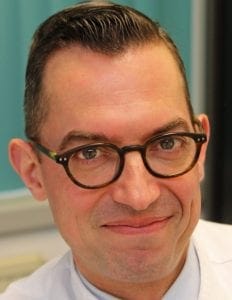My Teaching Journey – Professor Maurice van Steensel

Name: Maurice van Steensel
Name of institution: School of Life Sciences, University of Dundee, UK; Institute of Medical Biology, Singapore
Role: Professor of Genetic Dermatology; Senior Principal Investigator
What made you choose to become a lecturer?
I don't think I chose this role. Rather, it chose me. I've worked in universities for most of my professional life. In academic environments, at some point almost every professional will be asked to take on one or more teaching roles. In my case, it started with an undergraduate student who wanted to work with me when I was still in the early stages of my PhD. I found myself enjoying the experience, and have been teaching and supervising (under)graduate students ever since.
Then when I obtained my own PhD, it seemed natural to also have PhD students. I also was asked to lecture to medical students, and once I became a dermatologist I also started to supervise registrars. So it all came quite naturally, without me giving much conscious thought to the fact. I was nominated Clinician of the Year twice in my alma mater of Maastricht. It's an award for clinical teaching. Such skills are highly valued and evaluated toughly in Maastricht, so I guess I'm pretty good at it.
What are the qualifications needed for this role?
I'm a practicing dermatologist with an MD, and I hold a PhD in molecular genetics. I guess the minimal requirement for my role would be a PhD in a biological science. Other than that, it is about experience, enthusiasm and love for science and teaching, not about the diplomas one has.
Tell us about your teaching experience
My teaching experience spans almost 20 years now, and it is as varied as my career has been. I have lectured to students of medicine, life sciences, nursing and obstetrics. I have trained and supervised dermatology registrars in the clinic, and in my lab have worked with undergraduate and graduate students from various backgrounds.
I've also had the privilege of helping no less than 11 PhD students achieve their degrees. All of them have gone on to have successful careers, and I am very proud of them. Postgraduate education has also occupied my attention in the past. It is very important for medical professionals to stay up to date, and it has my been my pleasure to help them achieve this. I couldn't imagine ever doing science without transferring my knowledge and experience. Having students around is great for the energy in the lab.
What are some of the biggest challenges you face in the course of your work? How do you deal with them?
There are so many challenges facing scientists. Obtaining funding is one of them, and we worry about money all the time. That's not a fun challenge. Fortunately, there are also nice ones. One is to juggle my two appointments, which are almost on opposite sides of the world. However, this position offers unique opportunities, not in the least for my students who get to spend time in Europe as well as in Asia.
Another challenge, but one I enjoy very much is that of staying creative. Science is all about solving questions about how the world works, in my case about why people get sick. To make progress, one has to be able to think creatively. And there's ups and downs there – sometimes the creative juices just won't flow. To get them going again, I usually read across many scientific disciplines. Just to get ideas from elsewhere. And because I love all science and all knowledge, it is great fun to do!
What do you think makes your institution a popular choice among students?
I think the student experience is the number one reason, followed closely by the quality of our science and teaching. I'm a parent myself, and would like my children to live in a place that's safe, offers a great quality of life and allows them to grow to the fullest extent their potential allows. Dundee and Life Sciences tick all those boxes – a small and friendly city in one of the most beautiful countries on earth, and the UK's number one institute for biological sciences.
What advice do you have for parents who wish to enrol their child in your institution?
I would suggest that they attend Open Days and speak with both staff and students. By doing so, they will get an impression of the Institute and the education and experience it offers. I'm sure they will be impressed. I know I was when I first came here! Having a drive around the countryside and a walk around the city won't hurt either.
Keen to share your story? Head over to this page to submit it online!
Community Ambassador; as someone who was raised in a rather privileged family, I hope to address the inequity in educational outcomes based on the circumstance of birth. Bounced around between Australia and Singapore a fair bit.





